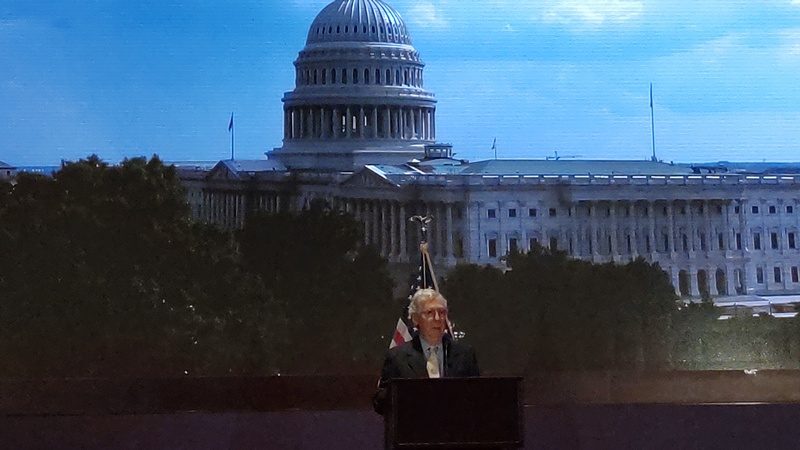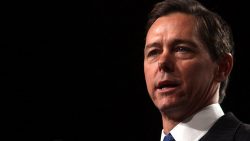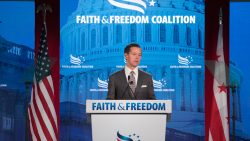A succession of congressional leaders paraded before Religious Right activists at a “town hall” event in the congressional auditorium at the U.S. Capitol Visitors Center on Thursday as part of the Faith and Freedom Coalition’s annual Road to Majority conference. It followed a luncheon with other members of Congress; the two events provide a way for Faith and Freedom Coalition Chairman Ralph Reed to kick off his annual event with a demonstration that he has access to high-level officials who are, in his words, “doing the Lord’s work in the Devil’s city.”
Some of the loudest cheers went for the smugly self-satisfied Senate Majority Leader Mitch McConnell, whom Reed introduced as a “total hero” for blocking Senate consideration of President Obama’s Supreme Court nomination of Judge Merrick Garland—and for using the power of his office to ram Trump’s judicial nominees through the Senate.
McConnell bragged about having done the opposite under President Obama, slowing Senate action to ensure that Obama’s successor would come into office with plenty of vacancies: “There were a lot of vacancies left when President Obama left office. I was the majority leader the last couple of years he was president,” he said, pausing for comic effect before adding to laughter and applause, “We didn’t have a lot of time.”
McConnell said that about one-fourth of U.S. circuit judges serving on the bench today comprises Trump nominees who were confirmed by the Senate in the past two-and-a-half years, and celebrated that Trump’s nominees are years younger, on average, than Obama’s nominees.
McConnell also devoted time to denouncing socialism, claiming that Democrats “want to turn us into something we’ve never been.” Referring to the Democratic presidential candidates, he claimed, “They’re all talking about turning us into a socialist country—all of them.” There’s no guarantee who will control the House, Senate, and White House after the next election, McConnell said, but he vowed: “If the U.S. Senate is the last place standing, none of this stuff will pass while I’m the majority leader.”
Also addressing the group was Rep. Mark Meadows, chair of the right-wing Freedom Caucus in the House of Representatives. Meadows couched his work in terms of spiritual warfare, asking people to pray for him and saying:
I mean, just bluntly, the battle is ongoing, and each and every day, the enemy makes himself very known. You can maybe even feel it sometimes in this city, the oppression that is really there, you can cut it like a knife.
And yet we know, we know the savior who has the power and the victory over death, and the power and victory over this city, and I will tell you this: Our God still reigns over the affairs of men, and we will never forget it.
Sen. Marsha Blackburn of Tennessee opened the town hall by talking through a top-10 list of things she’s been working on as a senator, which was heavy on Religious Right priorities like abortion, judicial confirmations, support for Israel, defending “free speech” on campuses, and challenging alleged anti-conservative “censorship” by tech companies.
Sen. Mike Lee of Utah, known for holding a Tea Partier’s restrictive view of the U.S. Constitution, told activists he has come to be more appreciative of the Declaration of Independence—and encouraged people to buy his book “The Lost Declaration.” Lee cited Alexis de Tocqueville’s writing about religion as the source of America’s strength, and added, “what makes us great is the choice we make every day to follow our God.” Lee, a Mormon, drew wild applause for offering a personal religious testimony about his faith in Jesus Christ.
Sen. James Lankford of Oklahoma described his decision to run for Congress as an act of obedience to God, who he said called him to run. Lankford told the assembled activists that some of them were probably resisting a similar divine command:
Some of you are here because you’re grassroots activists, and you’re excited about helping someone else. And what you’re really doing is disobeying God, because he’s telling you not to help someone else, he’s telling you to do it. And you’re short-circuiting what he’s calling you to do. Complete what he’s called you to do.
Josh Hawley, a freshman senator from Missouri, credited Religious Right activists with putting Trump in office, and lavished praise on the president:
What President Trump accomplished during his first two years in office is truly historic. And that is especially true for those of us who are devoted to protecting life and securing our religious liberty. We have never had a president in my lifetime who is this pro-life, this pro-family, this pro-freedom, this pro-religious liberty.
Hawley talked about the importance of federal judges and focused on “the fight against big tech and their attempt to shut us down, to censor us, to stop our voices, to write us right out of the public square.”
Right-wing leaders and activists have complained loudly that efforts by social media platforms to moderate hate speech have led to censorship of conservative views. Hawley was not the only politician who took a poke at Big Tech during the Road to Majority conference, but he may have sounded the loudest alarm and delivered the clearest threat:
These companies based out in Silicon Valley have amassed more power than any companies we’ve seen in history since I don’t know then. They’ve got all of this power, and they want to control the news that you get. They want to control what you’re able to say to your friends and to your family. They want to control the outcome of elections. Make no mistake about it. They want to control the flow of news and information to the American people so that they can control who gets elected in this country and who doesn’t.
And I for one am not willing to stand idly by while a bunch of unelected mega corporate Titans who get handouts from this government tell us what to think, tell us what to do, and tell us who’s going to be president…
That’s why I’ve introduced legislation that says if Big Tech wants to keep the special deals that they get from government—and by the way, they do get special deals. Google, Facebook, Twitter, they get treated differently by government than any other platform. They’re not treated like a newspaper, they’re not treated like a TV station, they’re not treated like Fox News.com. They get a special deal. They get special immunity. You can’t sue them or hold them accountable if they censor you. That’s the deal that this government gave the Big Tech.
Here’s what I say: If they want to keep that deal, if they want to keep those special immunities, that’s fine. Don’t censor conservatives. Don’t violate the First Amendment.
On the other hand, if they want to be liberal companies, and they want to push a progressive policy agenda and shove that down our throat, it’s the United States of America. They’re private companies, it’s a free country, they can do what they want, but not with the help of government—not with the help of our laws. We need to hold them accountable.
Reed told Faith & Freedom Coalition activists that former Sen. Sam Brownback, now the U.S. ambassador for religious freedom, told him that he can’t walk 20 feet in the White House or a Cabinet agency or on Capitol Hill “without running into somebody who is a) a committed believer and b) somebody I have worked with for at least 20 years in advancing our prop-family, pro-life agenda.”
Reed added that “there are more Christians serving in the Cabinet, serving in the White House staff, in the subcabinet, in Cabinet and agency staff, and here on the Hill under this president than all the previous presidents combined.” Of course, the only way that sentence could come even remotely close to being true is if by “Christians” Reed means only those Christians who share his conservative theology and right-wing politics—a shorthand often used by Religious Right leaders who tend to dismiss the legitimacy of the many Christians whose faith leads them in another direction.








